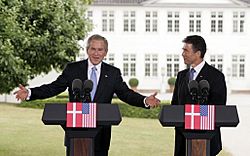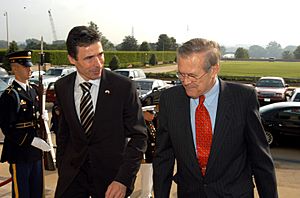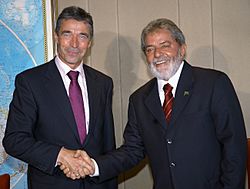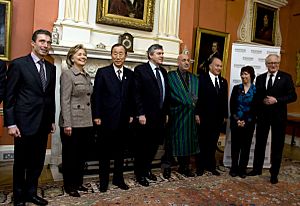Anders Fogh Rasmussen facts for kids
Quick facts for kids
Anders Fogh Rasmussen
S.K.
|
|
|---|---|
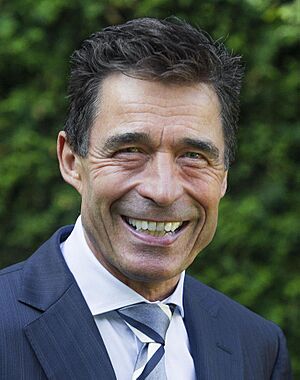
Rasmussen in 2013
|
|
| 12th Secretary General of NATO | |
| In office 1 August 2009 – 1 October 2014 |
|
| Preceded by | Jaap de Hoop Scheffer |
| Succeeded by | Jens Stoltenberg |
| Prime Minister of Denmark | |
| In office 27 November 2001 – 5 April 2009 |
|
| Monarch | Margrethe II |
| Deputy | Bendt Bendtsen Lene Espersen |
| Preceded by | Poul Nyrup Rasmussen |
| Succeeded by | Lars Løkke Rasmussen |
| Leader of Venstre | |
| In office 18 March 1998 – 17 May 2009 |
|
| Preceded by | Uffe Ellemann-Jensen |
| Succeeded by | Lars Løkke Rasmussen |
| Minister of Economic Affairs | |
| In office 18 December 1990 – 19 November 1992 |
|
| Prime Minister | Poul Schlüter |
| Preceded by | Niels Helveg Petersen |
| Succeeded by | Thor Pedersen |
| Minister of Taxation | |
| In office 10 September 1987 – 19 November 1992 |
|
| Prime Minister | Poul Schlüter |
| Preceded by | Isi Foighel |
| Succeeded by | Peter Brixtofte |
| Member of the Folketing | |
| In office 1 July 1978 – 20 April 2009 |
|
| Constituency | Zealand Greater |
| Personal details | |
| Born | 26 January 1953 Ginnerup, Denmark |
| Political party | Venstre |
| Spouse |
Anne-Mette Rasmussen
(m. 1978) |
| Children | 3 |
| Parents | Knud Rasmussen Martha Rasmussen |
| Alma mater | Aarhus University |
Anders Fogh Rasmussen (born 26 January 1953) is a Danish politician. He served as the Prime Minister of Denmark from November 2001 to April 2009. After that, he became the Secretary General of NATO, a military alliance, from August 2009 to October 2014. Since then, he has started his own political consulting company, Rasmussen Global, and founded the Alliance of Democracies Foundation. He also works as a senior adviser for Citigroup.
Rasmussen was first elected to the Danish Parliament, called the Folketing, in 1978. He held several government jobs, including Minister of Tax and Minister of Economic Affairs. Early in his career, he wrote a book called From Social State to Minimal State in 1993. In this book, he shared his ideas about how the government should be smaller. However, his views became more moderate over time. In 1998, he became the leader of the Venstre party. His party formed a government with the Conservative People's Party in 2001. They won elections again in 2005 and 2007. His government often worked with the Danish People's Party to get things done.
His government made rules to limit immigration and froze tax rates. They also made a big change to how local governments were organized. They reduced the number of municipalities and replaced the thirteen counties with five larger regions. Rasmussen called this "the biggest reform in thirty years."
He left his job as Prime Minister in April 2009 to become the Secretary General of NATO. He worked to expand NATO's role beyond its original purpose of dealing with the Soviet Union during the Cold War. His time as NATO Secretary General ended on September 30, 2014.
Contents
About Anders Fogh Rasmussen
Anders Fogh Rasmussen was born in 1953 in Ginnerup, Jutland, Denmark. His parents were Knud and Martha Rasmussen. His middle name, Fogh, was his mother's maiden name. People often call him Fogh Rasmussen to tell him apart from other politicians with the same last name.
He went to Viborg Cathedral School and then studied economics at the University of Aarhus. He graduated in 1978. He has been involved in politics for most of his life. He is married to Anne-Mette, and they have three children and six grandchildren. He enjoys cycling and even rode part of the Tour de France route in 2008. He is not related to the previous or next Prime Ministers of Denmark, who also had the last name Rasmussen.
Early Political Career
Rasmussen started his political career by winning a seat in the Folketing (Danish parliament) in 1978. He held positions in both the government and the opposition.
Political Ideas
Generally, Rasmussen believes in making the government smaller and allowing more private businesses. In his 1993 book, From Social State to Minimal State, he suggested big changes to Denmark's welfare system. He wanted lower taxes and less government involvement in businesses and people's lives.
Leaving His Minister Job
From 1987 to 1990, he was the Minister for Taxation. From 1990 to 1992, he was the Minister for Economy and Taxation. In 1992, Rasmussen resigned from these jobs. This happened after a report said he had given incomplete information to the Folketing about delaying some payments. He disagreed with the report but chose to leave his posts.
2001 Election Victory
His Liberal party, Venstre, won the election in November 2001. This was a big change in Danish politics. It was the first time since 1920 that the Social Democratic Party was not the largest party in the parliament. This allowed Rasmussen to form his first government.
Prime Minister of Denmark
After the 2001 election, Venstre formed a government with the Conservative People's Party. They were a minority government, meaning they needed support from other parties, like the Danish People's Party, to pass laws. This group of parties won the elections again in 2005 and 2007.
After becoming Prime Minister, Rasmussen changed some of his earlier views. He seemed to be more in favor of a "third way" approach, which combines ideas from different political sides. His government put in place strict rules to limit the number of immigrants coming to Denmark.
Tax Changes
After the 2001 elections, Rasmussen's party stopped all tax increases. They said that taxes had been growing too much under the previous government. This "tax stop" was popular with voters.
Later, some small tax cuts were made. For example, people with jobs got a small tax reduction. Also, a special "employment deduction" was created to encourage people to work. In 2009, a major tax reform happened. The overall tax rate was reduced, and many people paid less tax.
Leading the EU in 2002
Rasmussen was the leader of the European Union for six months in 2002. During this time, he showed his strong support for the EU. He also made a public apology on behalf of Denmark for its cooperation policy during World War II.
Denmark and the Iraq War
As Prime Minister, Rasmussen strongly supported the 2003 Iraq War. Many people in Denmark and in parliament were against it. Denmark was one of only five countries that took part in the initial invasion. Danish troops were stationed in Iraq from 2004 to 2007.
In March 2003, Rasmussen stated that Iraq had weapons of mass destruction. He said, "Iraq has weapons of mass destruction. This is not something we think. We know it. Iraq has itself admitted that it had mustard gas, nerve gas, anthrax, but Saddam will not settle. He will not tell us where and how the weapons have been destroyed. We know from the UN inspectors, so there is no doubt in my mind."
Views on Gay Marriage
In Denmark, civil unions for gay couples became legal in 1989. In 2004, Rasmussen said he believed that gay couples should be able to marry in religious ceremonies. However, he also said that religious groups should decide for themselves if they wanted to perform such ceremonies.
2005 Election
On January 18, 2005, Rasmussen called for an election to be held on February 8, 2005. His government was criticized for its slow response to the 2004 Indian Ocean earthquake, which affected many Danes.
Even though his party lost some seats, they were still able to form a government. Rasmussen formed his second government on February 18. He received the most "personal votes" of any politician in the Danish Parliament at that time.
Muhammad Cartoons and Protests
A big challenge during Rasmussen's time as Prime Minister was a controversy over cartoons. In September 2005, a Danish newspaper printed 12 cartoons that showed different interpretations of Muhammad. Some Muslims found these cartoons offensive. Rasmussen refused a request from 11 ambassadors from Middle Eastern countries to discuss the issue. He later said he was "deeply distressed that the cartoons were seen by some Muslims as an attempt by Denmark to mark and insult or behave disrespectfully towards Islam or Mohammed." He described the situation as Denmark's worst international crisis since World War II.
Local Government Reform
One of Rasmussen's main projects was to change how local governments worked. The goal was to combine smaller municipalities and get rid of the counties. Many public services, like the national health service, were combined into five larger regions. The number of municipalities was reduced from 271 to 98. This reform was approved in June 2005 and started on January 1, 2007.
2007 Election and Resignation
In October 2007, Rasmussen called for the 2007 general election, which took place on November 13. His center-right group of parties won enough seats to form a majority. Rasmussen became the longest-serving Liberal Prime Minister of Denmark.
After his reelection, rumors began that Rasmussen might be a candidate for important international jobs. He denied these rumors until just before it was announced that he would become the Secretary General of NATO.
Rasmussen supported Israel's right to defend itself during the Gaza–Israel conflict. He said that "it was Hamas that broke the truce, and Hamas started the conflict by firing rockets on Israel. No country can just passively accept being fired on."
After he was confirmed as the NATO Secretary General, Rasmussen announced that he would resign as Prime Minister of Denmark on April 5, 2009.
NATO Secretary General
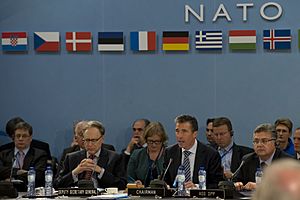
Anders Fogh Rasmussen became the 12th NATO Secretary General on August 1, 2009. The announcement was made on April 4, 2009. At first, Turkey was against Rasmussen's appointment, partly because of how he handled the Muhammad cartoons issue. Turkey also claimed that a Danish TV channel, Roj TV, was linked to a group called the Kurdistan Workers Party (PKK). Eventually, Turkey agreed to Rasmussen's appointment after getting assurances that Roj TV would be dealt with.
After starting his new job, Rasmussen's first trip was to Afghanistan. There, he met with President Hamid Karzai and other Afghan ministers to talk about the upcoming elections.
2010: Afghanistan Conference
On January 28, 2010, Rasmussen attended a big meeting in London about Afghanistan. At this meeting, leaders decided on a plan for Afghanistan for the next ten years. Many important leaders, including Gordon Brown, Hillary Clinton, and Catherine Ashton, were there.
2011: Libya Intervention
In April 2011, during the 2011 Libyan civil war, Rasmussen said that NATO's mission was to protect civilians in Libya. He stated that NATO was "not in Libya to arm people. We are in Libya to protect civilians against attacks" from forces loyal to Muammar Gaddafi.
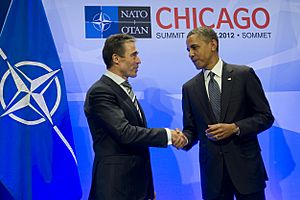
By October 2011, Rasmussen said that NATO's intense 7-month mission was almost over. The last strongholds of Gaddafi's forces had fallen, and Gaddafi himself had been killed while trying to escape.
2012: Term Extension
The Secretary General usually serves for four years. On October 3, 2012, Rasmussen's term was extended by one year, meaning it would end on July 31, 2014.
2013: NATO's Open Door
In February 2013, Rasmussen visited Ireland. He said that NATO has an "open-door policy" for European countries that want to join. He explained that NATO's door is open to democracies that meet the requirements and can help with security in Europe and the Atlantic region. Ireland is not a NATO member but works with NATO through a program called Partnership for Peace.
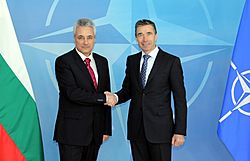

In December 2013, Rasmussen spoke at a meeting of the European Council. He was against plans to create a European Air Force with surveillance drones and transport planes. He believed that NATO was doing a good job with European defense and that things should stay as they were.
2014: End of Term

On March 28, 2014, Jens Stoltenberg was chosen to be Rasmussen's successor as secretary-general. He took office on October 1, 2014.
In April 2014, Rasmussen wrote an article warning NATO allies to invest more in their armed forces. He said that "Russia's illegal aggression against Ukraine" was clear.
On April 15, a meeting of EU Defense Ministers took place. The next day, NATO's Defense Ministers met. Rasmussen said that NATO's main job is to protect its allies. He announced that NATO would have more planes in the air, more ships on the water, and be more ready on land.
In June 2014, Rasmussen claimed that Russia was working with environmental groups to keep Europe dependent on Russian gas. He did not provide evidence for this claim.
Organizations After NATO
Rasmussen Global
After leaving NATO on October 1, 2014, Rasmussen started his own political consulting company called Rasmussen Global. This company helps with issues like security, relations between Europe and North America, the European Union, and economic growth. In 2016, he wrote a book called 'The Will to Lead', where he shared his ideas about America's role as a global leader.
On May 27, 2016, Rasmussen became an adviser to President Petro Poroshenko of Ukraine. He also created a group called Friends of Ukraine to raise awareness about Ukraine and encourage reforms there.
In April 2020, the global bank Citi announced that Rasmussen would join them as a senior adviser for their business in Europe, the Middle East, and Africa, focusing on the Nordic region.
In June 2022, Ukrainian President Volodymyr Zelenskyy asked Anders Fogh Rasmussen to lead an international group on security guarantees for Ukraine. This group created the Kyiv Security Compact, which became the basis for a G7 declaration on security guarantees. This declaration was signed by NATO allies at the 2023 NATO Summit in Vilnius. At the 2024 NATO Summit in Washington, individual agreements between Ukraine and NATO allies were made official in the Ukraine Compact.
Alliance of Democracies Foundation
In 2017, Rasmussen founded the Alliance of Democracies Foundation. This is a non-profit organization that works to promote democracy and free markets around the world. One of its main events is the Copenhagen Democracy Summit, an annual conference that brings together political and business leaders from democratic countries. The first summit in 2018 included Joe Biden as a speaker. Other speakers have included Tony Blair, Mike Pompeo, and John Kerry.
The Foundation also runs the Transatlantic Commission on Election Integrity. This commission helps find ways to protect the fairness of democratic elections. Rasmussen co-founded this commission with former US Homeland Security Secretary Michael Chertoff and Joe Biden.
Honours and Awards
 Commander of the Order of Dannebrog (Denmark, 2001)
Commander of the Order of Dannebrog (Denmark, 2001) Commander 1st Class of the Order of Dannebrog (Denmark, 2002)
Commander 1st Class of the Order of Dannebrog (Denmark, 2002) Grand Cross of the Order of Dannebrog (Denmark, 2009)
Grand Cross of the Order of Dannebrog (Denmark, 2009) Medal of Merit in Gold (Denmark, 2002)
Medal of Merit in Gold (Denmark, 2002) Grand Cross of the Order of the Southern Cross (Brazil, 2009)
Grand Cross of the Order of the Southern Cross (Brazil, 2009) Knight 1st class of the Order of the Balkan Mountains (Bulgaria, 2014)
Knight 1st class of the Order of the Balkan Mountains (Bulgaria, 2014)- St. George Medal, 1st Class (Bulgaria, 2014)
 Knight of the Order of the Cross of Terra Mariana (Estonia, 2009)
Knight of the Order of the Cross of Terra Mariana (Estonia, 2009) Grand cross of the Order of Merit of the Federal Republic of Germany (Germany, 2002)
Grand cross of the Order of Merit of the Federal Republic of Germany (Germany, 2002) Knight Grand Cross in the Order of Orange-Nassau (Netherlands, 2014)
Knight Grand Cross in the Order of Orange-Nassau (Netherlands, 2014) Grand Cross of the Order of Ruben Darío (Nicaragua, 2003)
Grand Cross of the Order of Ruben Darío (Nicaragua, 2003)- Grand Cross of the Order of Pedro Joaquín Chamorro (Nicaragua)
 Grand Officer of the Order of the Three Stars (Latvia, 2004)
Grand Officer of the Order of the Three Stars (Latvia, 2004) Grand Cross of the Order of the Grand Duke Gediminas (Lithuania, 2004)
Grand Cross of the Order of the Grand Duke Gediminas (Lithuania, 2004) Grand Cross of the Order of the Oak Crown (Luxembourg, 2003)
Grand Cross of the Order of the Oak Crown (Luxembourg, 2003) Grand Cross of the Order of Merit of the Republic of Poland (Poland, 2003)
Grand Cross of the Order of Merit of the Republic of Poland (Poland, 2003) Grand cross of the Order of Merit (Portugal, 1992)
Grand cross of the Order of Merit (Portugal, 1992) Grand Cross of the Order of the Star of Romania (Romania, 2004)
Grand Cross of the Order of the Star of Romania (Romania, 2004) Grand Cross of the Order of the Polar Star (Sweden, 2007)
Grand Cross of the Order of the Polar Star (Sweden, 2007) Order of Liberty (Ukraine, 2014) "For his important work in developing cooperation between Ukraine and NATO, and for strongly supporting Ukraine's independence and territory."
Order of Liberty (Ukraine, 2014) "For his important work in developing cooperation between Ukraine and NATO, and for strongly supporting Ukraine's independence and territory." Honorary Knight Commander of the Order of St Michael and St George (United Kingdom, 2015)
Honorary Knight Commander of the Order of St Michael and St George (United Kingdom, 2015)- Doctor Honoris Causa title by the University of Bucharest (2013)
See also
 In Spanish: Anders Fogh Rasmussen para niños
In Spanish: Anders Fogh Rasmussen para niños
- Cabinet of Anders Fogh Rasmussen I
- Cabinet of Anders Fogh Rasmussen II
- Cabinet of Anders Fogh Rasmussen III
- List of prime ministers of Denmark
- Politics of Denmark
 | William M. Jackson |
 | Juan E. Gilbert |
 | Neil deGrasse Tyson |


